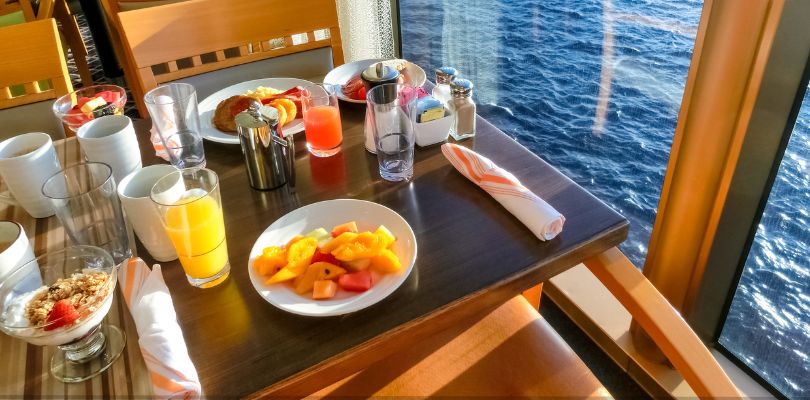1. Avoid the Buffet
Cruise ship buffets are notorious for offering a vast array of food options that can be tempting but often come with risks. While buffets provide convenience and variety, they can also be a breeding ground for foodborne illnesses. The constant exposure to heat and cold, combined with high guest traffic, increases the risk of contamination. Additionally, the overwhelming choices can lead to overeating and poor food combinations that might upset your stomach.
If you must visit the buffet, choose freshly prepared items, avoid anything that has been sitting out for a long time and practice good hygiene. Opt for items that are cooked to order and avoid raw or undercooked foods.
Adult-onset ashtma develops in adulthood rather than childhood. While causes may be similar, there are some ways symptoms may differ.
2. Raw Seafood
While raw seafood like sushi and sashimi might be appealing, it carries a higher risk of harboring harmful bacteria or parasites. On a cruise, where refrigeration and handling practices can vary, the risk is further heightened.
Stick to seafood that is thoroughly cooked to reduce the risk of foodborne illness. If you crave seafood, choose dishes like grilled fish or seafood stews that are well-cooked.
3. Street Food from Port Stops
Street food can be delicious, but it’s often prepared in less controlled environments compared to the cruise ship’s kitchens. This increases the risk of contamination and foodborne illnesses.
Enjoy street food with caution. Choose vendors with high turnover and visible food safety practices, and avoid items that seem to be improperly handled or stored.
4. Foods High in Sugar and Fat
Cruise ships offer an abundance of high-sugar and high-fat foods, such as pastries, ice cream and fried snacks. Consuming these in excess can lead to digestive discomfort, weight gain and general malaise.
Moderation is key. Opt for healthier options like fruits, salads and lean proteins when available. If you indulge, balance it with lighter meals and stay hydrated.
5. Spicy and Heavy Foods
Spicy and heavily seasoned foods can irritate the digestive system, particularly if you're not used to them. This can lead to heartburn, indigestion and discomfort during your cruise.
Choose milder options and avoid overly spicy dishes. If you enjoy spicy foods, try to moderate your intake and be mindful of how your body reacts.
6. Undercooked or Unwashed Vegetables
Raw or undercooked vegetables can carry bacteria, particularly if they have not been properly washed. On a cruise, where food safety practices can vary, this risk is more pronounced.
Ensure that any vegetables you consume are thoroughly washed or cooked. Opt for vegetables from reputable dining venues rather than raw options from less controlled environments.
7. Heavy Meals Right Before Activities
Eating large or rich meals right before engaging in physical activities like excursions or swimming can lead to discomfort, bloating and nausea.
Plan your meals around your activities. Eat lighter, easily digestible foods before engaging in physical activities and leave time for digestion.
8. Unfamiliar Foods
Trying new and unfamiliar foods can be exciting, but if your digestive system isn’t used to them, it can lead to unexpected discomfort or allergic reactions.
While exploring new cuisines is part of the travel experience, introduce unfamiliar foods gradually and in small amounts to gauge how your body reacts.
9. Room Temperature Dairy Products
Dairy products like milk, cheese and yogurt that are not kept at proper temperatures can spoil quickly and harbor harmful bacteria, leading to foodborne illnesses.
Ensure that any dairy products you consume are stored and served at the correct temperatures. Avoid dairy items that have been sitting out for an extended period.
10. Leftovers from Previous Meals
Leftovers, especially those that have not been properly refrigerated, can develop bacteria and lead to food poisoning.
It's best to eat freshly prepared meals and avoid leftovers. If you do have leftovers, ensure they are stored properly and consumed within a safe time frame.
Cruise Food Warnings
Navigating food choices on a cruise is essential for ensuring a comfortable and enjoyable journey. By avoiding certain high-risk foods and practicing mindful eating, you can minimize the risk of foodborne illnesses and digestive issues. Remember to enjoy the diverse dining options available while making choices that support your health and well-being. Bon voyage and happy dining!







